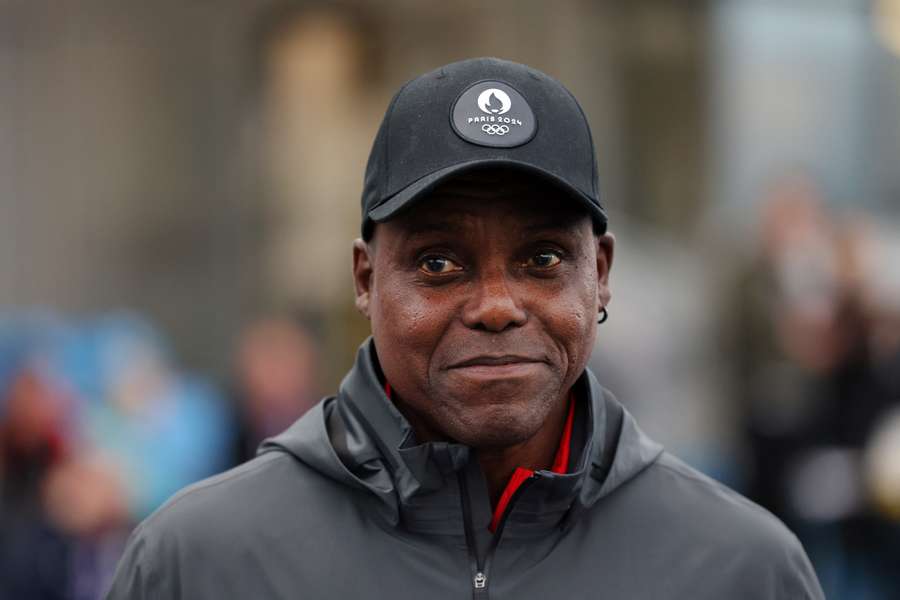Lewis: Four long jump golds my Olympic pinnacle

Lewis showed remarkable longevity to claim long jump golds at the 1984, 1988, 1992 and 1996 Olympics.
The 63-year-old American's Olympic haul also included five more golds - including back-to-back 100m titles in Los Angeles and Seoul - and a silver. He is also an eight-time world champion.
Taking inspiration from Jesse Owens, who won four gold medals at the 1936 Berlin Olympics, Lewis admitted to having wanted to be a "global superstar" capable of entertaining crowds. He emulated Owens' feat at the 1984 Los Angeles Games.
But his life in track and field did not come without problems, least of all the backlash from Olympic officials and the then-governing body of athletics (IAAF) to his role in pushing for athletes to be properly financially rewarded.
"It was in November 2022 when I pulled the last knife out of my back!" Lewis told journalists at the world relay championships in Bahamas earlier this year.
"I knew early on that I was going to get those knives in my back, but the bigger picture was more important."
Lewis was in no doubt that his "proudest moment" was winning "four in a row".
"I tried four times to win four gold medals and I only did it once," he said.
"When I went to Los Angeles in 1984, there were kids in the stands with their parents. And when I was in Atlanta in 1996, there was a guy that said 'my father took me to see you in LA and now this is my son and I'm taking him to see you in Atlanta'. That was pretty crazy."
Lewis made the US Olympic team aged 18 but could only look on as the Americans boycotted the 1980 Moscow Olympics.
"I did remember seeing older athletes I trained around and it was their last shot. I wasn't dismissive, but I didn't understand their pain," he said.
"Fortunately I was able to go to the Games again."
Lewis said he hoped his legacy would include leaving the sport "much better than when I came in".
"In my tenure, we became professional (and) drugs blew up," he said.
The most notorious incident was when Ben Johnson was stripped of gold for doping at the 1988 Seoul Games.
"I don't even look at the 100m race in 1988 as a negative," Lewis said.
"That might be the most important moment in drug testing sports history and I was a part of that moment, so therefore I look at that as a positive."
Comparisons with Owens are a moot point for Lewis.
"All I know is that you live in your era. This was Jesse Owens. This was me. This is them. You know, I beat these people, he beat those people. You can't compare," he said.
"I'm always looking forward. I ran 9.86sec 33 years ago. A lot of people have run 9.86, but I would have been on every Olympic podium apart from London in 2012 since then."
Meeting Jesse Owens
Lewis said he realised he was on the brink of something big when, after winning two of his six overall National Collegiate Athletic Association titles for the University of Houston, he was mentioned in the same breath as Owens.
"I’d met him as a child, so I was like, wow. And I realised the impact that would have on my career," he said.
"I then started saying, 'well, if I become number one in the world in the 100m, then I'm the world's fastest human'.
"That was it in those days. That world's fastest human title was money. It was notoriety. It was recognition of all the things that I needed to do, what I wanted to do.
"I really wanted to be a global superstar and I worked for it."
Lewis added: "The Jesse part was more personal, he affected me in a bigger way."
Lewis said Owens had inspired his love of history, notably around civil rights, Nazi Germany and World War II.
"That’s the thing that Jesse did," he said. "That's something that happened because of him, which is so much bigger than athletics.
"I'm still friends with his granddaughter. I saw his mother, his wife and him throughout the years. He was huge, an extremely important factor in my life, in the overall arc."
Turning to the Paris Games which open on July 26, Lewis said they would be the first "clean" Olympics since London after the 2016 Rio Games were plagued by the zika virus and Covid caused a year's delay to the 2020 Tokyo Games.
"I think it can be an incredible Games. I'm looking forward to it," he said.
Asked whether double world sprint champion Noah Lyles could have a tilt at emulating a four-gold haul in the French capital, Lewis said: "Trust me, it's hard enough to win three, period!
"It's really, really hard to do it. Let him focus on that."
Lyles would need an unlikely gold in the 4x400m relay to get his fourth gold.
"If the relay pans out, that could be wonderful for the sport," Lewis said.

